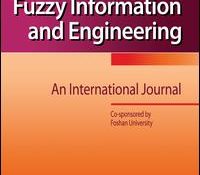tandfonline.com har udgivet en rapport under søgningen “Teacher Education Mathematics”: ABSTRACT Formulae display:?Mathematical formulae have been encoded as MathML and are displayed in this HTML version using MathJax in order to improve their display. Uncheck the box to turn MathJax off. This feature requires Javascript. Click on a formula to zoom. ABSTRACT The present study proposes a flexible/soft model for investigating the role of philosophic-mindedness, creativity, mathematics self-efficacy, and mathematics self-concept in predicting math achievement. To do this end, a fuzzy regression model is developed. Two common criteria are used to evaluate the obtained model. Moreover, the predictability of the model is explained. The case study involves 28 male students from Marand, Iran (year 2015–2016) who took part in a test of mathematics achievement. The participants were junior high-school students… Continue Reading →
Like this:
Like Loading...
eric.ed.gov har udgivet: While previous research has outlined factors that can be used to predict academic self-concept among college students, much of this research pays little attention to how self-concept develops differently for unique subgroups of students. This paper examines the development of mathematical self-concept during college for four groups of students who entered college with significantly different levels of math confidence: (1) men in math-intensive majors; (2) women in math-intensive majors; (3) men in non-math-intensive majors; and (4) women in non-math-intensive majors. Data are examined from surveys of over 14,000 college freshmen at 191 institutions who were followed up 4 years after college entry. Regression analyses describe how the factors contributing to the development of math self-concept differentiate among the four groups and suggest how women who persist in… Continue Reading →
Like this:
Like Loading...
tandfonline.com har udgivet en rapport under søgningen “Teacher Education Mathematics”: ABSTRACT ABSTRACT This article deals with the connection between self-concept, self-care in relation to a adolescents’ risk behaviour. The work describes the connection between self-care and at risk behaviour, which influences the teenager and their behaviour. Thereafter, it focuses on the interconnection of self-concept and risk behaviour as an important element during the formation of the personality at risk behaviour. In the last part, the authors spend time on the meta-analysis of the chosen research. The self-care influences the self-concept, therefore on the basis of the identified interconnections we can speculate to what degree of development of self-care we are able to preventively and intervention affect at risk behaviour. The significant result of the research is, that the development of… Continue Reading →
Like this:
Like Loading...
eric.ed.gov har udgivet: The differences in effects of heterogeneous and homogeneous regrouping for math on academic ability and self-concept in math were investigated. Five sixth-grade students from both grouping placements were interviewed to determine their self-concept of their math abilities. All students labeled as average or below from both placements were given an assessment of basic grade-level math skills. The classes containing these students were observed, and each placement had the same teacher providing all math instruction. The results indicated that the homogeneous students liked their math classes better and were more likely to compare themselves above their classmates in ability than the heterogeneous students. However, there were almost no differences between overall self-concept in math between the placements, and the scores on the assessment substantially favored the heterogeneous placement.… Continue Reading →
Like this:
Like Loading...

